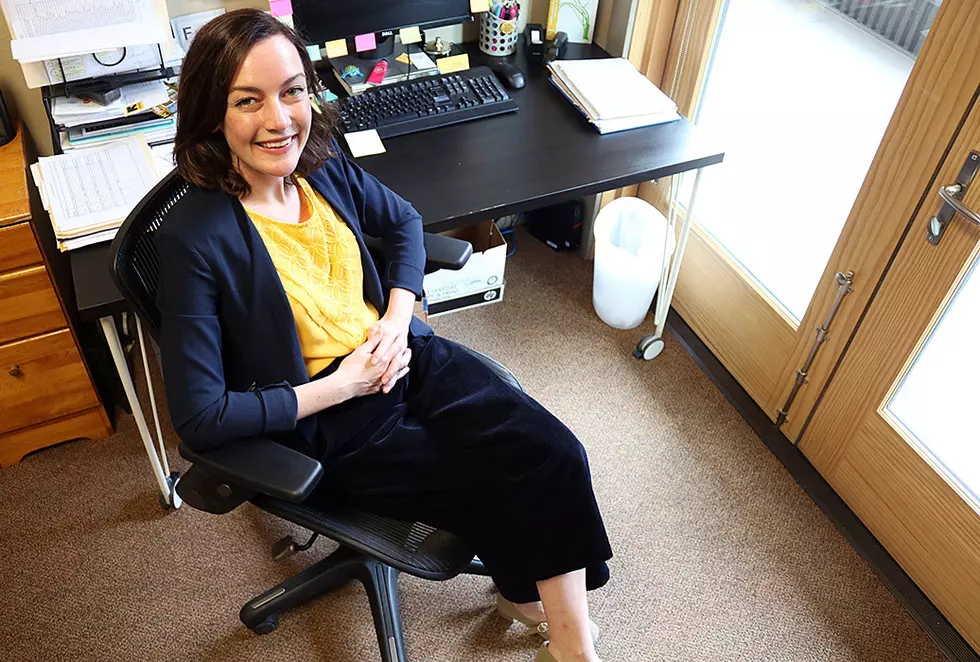
“A strong sense of welcome:” Missoula refugee efforts attract Australian review
Before Talia Stump set out on her global mission to glean best practices around the world's refugee resettlement programs, she did what most researchers do and started with something of a Google search.
The Churchill Fellow in Refugee Resettlement Policy and Practice from Sydney, Australia, set her itinerary based upon the results. Missoula was among two U.S. cities that made the list.
“I was interested because it was a new resettlement location,” Stump told the Missoula Current. “It really does seem to have this strong sense of welcome and support from within the community.
“I'm trying to peel that back and understand what the ingredients are that sets Missoula apart, and what are the really practical ideas I might be able to take back and share with towns in Australia.”
Stump this week visited with members of the International Rescue Committee in Missoula, along with other community members who have helped spearhead Missoula's resettlement efforts over the past three years.
In that time, more than 200 refugees have resettled in Missoula from the Democratic Republic of Congo, Eritrea, Ethiopia, Syria and Iraq. While the local quota has slowed under the Trump administration, the program remains alive and the resettlement effort continues.
It's success and the positive media surrounding it attracted Stump's attention.
“It indicated to me there was this unique and strong sense of community,” she said. “That's one of the key things I'm interested in looking at. Also, Missoula was a new location and I thought it would make it an interesting case study, being just two or three years down the track.”
Stump's international stops include Canada, Germany, Norway and Sweden, along with St. Cloud, Minnesota, and Missoula. And it wasn't a trip born from mere curiosity. Her findings will inform the Australian national and territorial governments, along with smaller towns interested in participating in the global resettlement effort.
“In Australia, there's an increasing emphasis at the moment on how we can resettle refugees outside of our major cities,” Stump said. “There's a lot of interest from smaller cities and rural towns, where there's employment opportunities and where there's a lot of goodwill from within that community to want to get involved and settle refugees.”
That includes developing a policy that helps communities lead their own initiatives through secondary migration. While most Australian refugees land in Sydney, Stump said, smaller communities are looking to recruit their skills and widen their own diversity.
Such goals remain at the heart of efforts in Missoula, and the success stories aren't hard to find. Iraqi cousins Ammar Omar and Wisam Raheem recently opened Kamoon Arabian Cuisine. Hadegeka Gilbert and Joel Kambale from Congo started the Universal Revival Church to share their own African roots and traditions through religion.
Other refugees in Missoula have forged their own opportunities, adding to the richness of the larger community.
“I think it's a very interesting time globally at the moment,” said Stump. “Views are becoming increasingly polarized, and that's one thing that really interested me: How can a community come together and look objectively at the situation refugees are going through and the refugee process, but also maintain that sense of welcome in the face of this polarization and the negative rhetoric around immigration and refugees.”
Missoula's resettlement efforts began in 2016 when Soft Landing was formed. It's members were initially stirred by the death of 3 year-old Aylan Kurdi, a Syrian refugee who drowned on the shores of Turkey. With wide community support, the group petitioned the International Rescue Committee to reopen its Missoula office.
The IRC did so in March 2016.
“We understand that a key part of refugee resettlement is to have jobs in place for people,” said Stump. “But equally important, it needs to have a sense of welcome and inclusion within that receiving community. That's why I chose Missoula.”
Since the IRC opened in Missoula, the community effort has grown to include Missoula County Public Schools, local churches, organizations and individuals. The city of Missoula joined the Building Welcoming Cities Campaign in a resolution adopted in 2016.
Missoula's combined efforts have garnered international attention, including the LA Times, the BBC and Starbucks, which featured Mary Poole of Soft Landing in a documentary on “ordinary Americans who are bringing about extraordinary changes.”
Stump said rural Australian communities are looking to build something similar to what now exists in Missoula.
“In rural Australia, it's not just about seeing refugees as a purely humanitarian exercise,” she said. “It's also about towns looking at their own socio and economic objectives, and how can refugees be seen as an asset with incredible skills, with experience, where they can contribute to building a community.”
The immigrant community in a five-county region surrounding Missoula paid $7 million in state taxes in 2016 and more than $19 million in federal taxes, according to a report released last year by the New American Economy and the International Rescue Committee.
While immigrants in the region number less than 5,000, or just 2.3 percent of the population, they earned a combined $119 million the year the study was conducted. Collectively, they represented more than $93 million in spending power after taxes.
The economics behind such figures could be a boost to rural communities, Stump said.
“From what I've learned so far, there's some really strong learnings I can take back to Australia from here,” she said. “First and foremost, it seems to be around how to harness the good will and welcome that's existing in the community of Missoula, and to channel that to supporting new Americans and refugees that are moving into the town.
“I hope to feature a series of different initiatives happening in Missoula through the IRC and the resettlement community partners here in my final report to inform some of the programs going on down in Australia.
